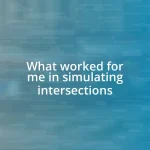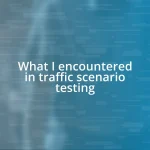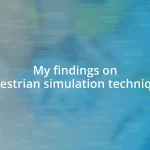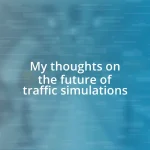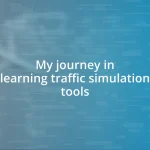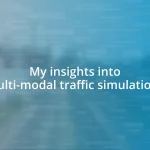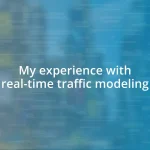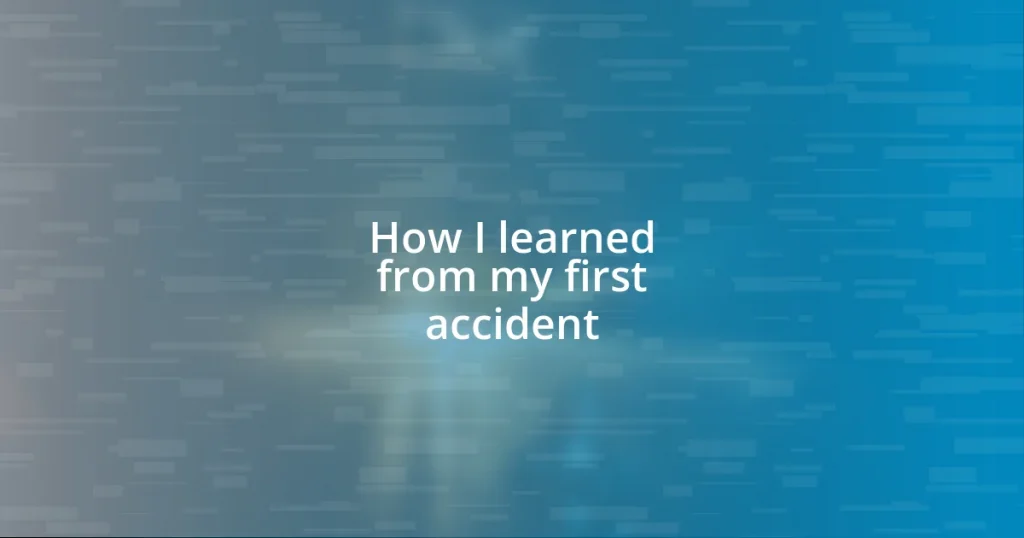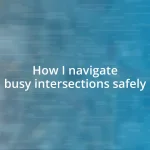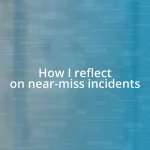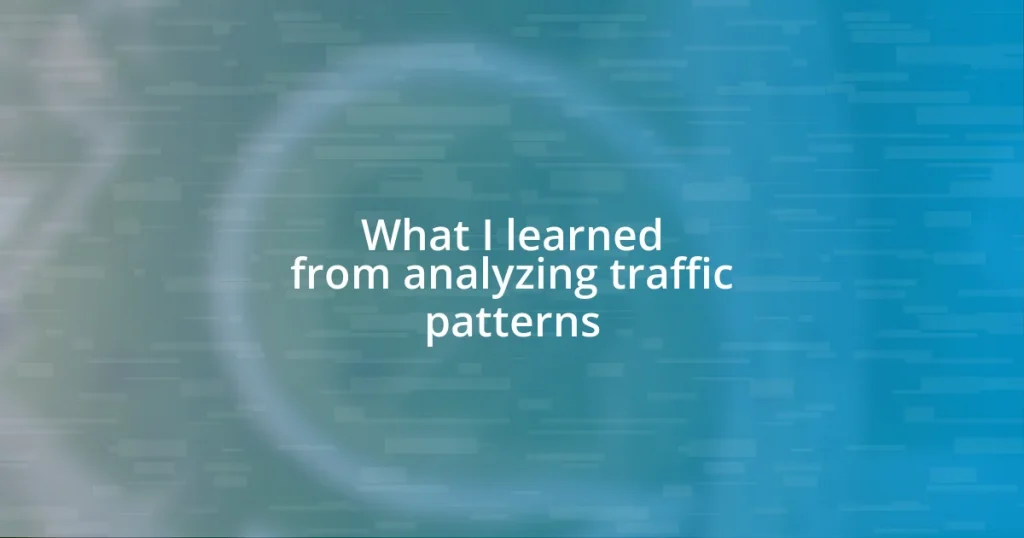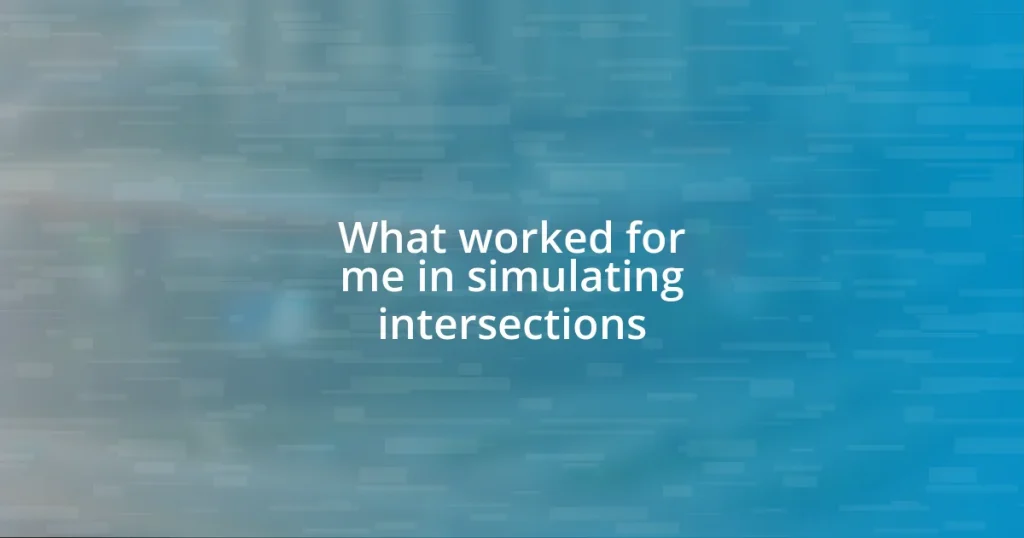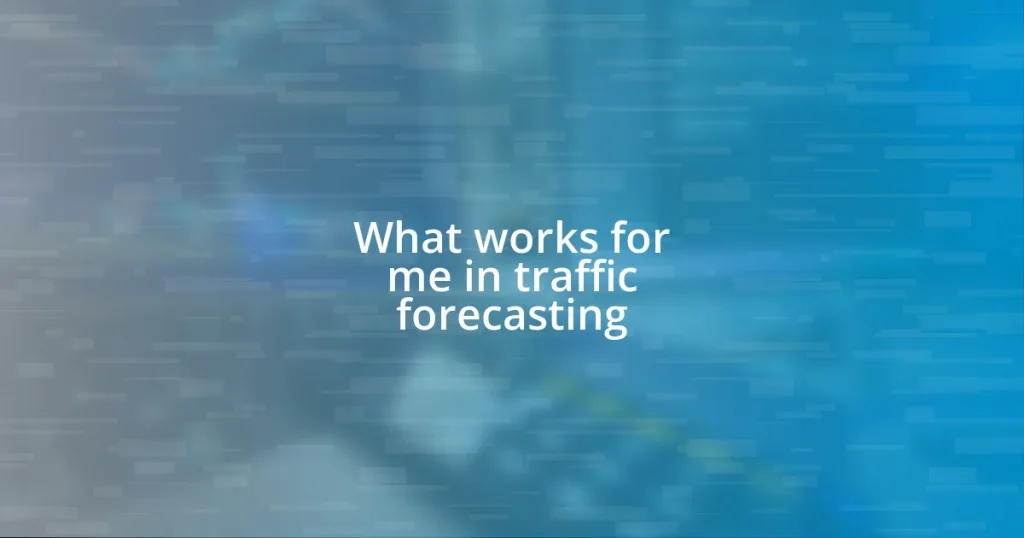Key takeaways:
- The accident highlighted the emotional impact of driving incidents, emphasizing fear, vulnerability, regret, and eventual gratitude as key emotions experienced during and after the event.
- Confronting fears and embracing vulnerability led to personal growth, improved driving habits, and the development of emotional awareness as essential tools for recovery.
- Sharing the experience with others, through support groups and mentoring, fostered connections and provided a sense of belonging, enhancing confidence in driving again.
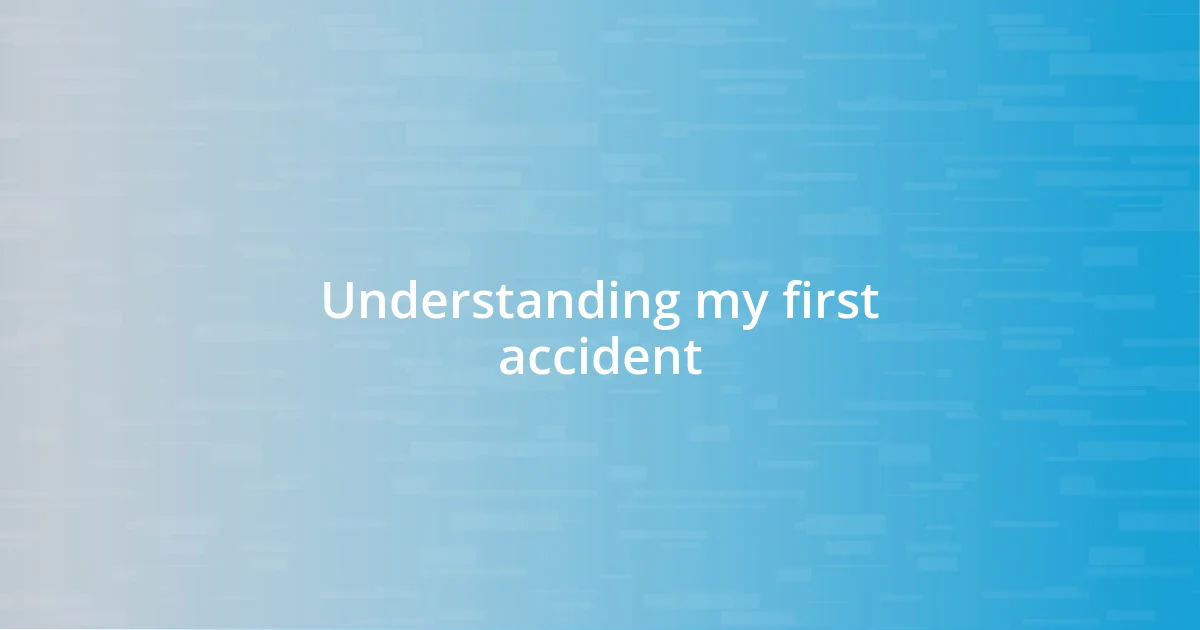
Understanding my first accident
Understanding my first accident was a pivotal moment in my life. I can still vividly recall the sharp pang of fear when I realized what had just happened. It wasn’t just about the physical impact; the shock of the moment left an emotional imprint that lingered. How often do we consider the emotional aftermath of such events?
In that instant, I learned how quickly things can spiral out of our control. The world felt chaotic, and I remember sitting in the car, breathing heavily, trying to process everything. Was it really just a split second that changed my life? That thought echoed in my mind like a haunting reminder of my vulnerability.
The experience also opened my eyes to the fragility of safety. After the accident, I felt more anxious driving than ever before. It was as if every turn held a new fear; how could I regain my confidence? Reflecting on those feelings made me realize that understanding our reactions can be just as important as understanding the accident itself.
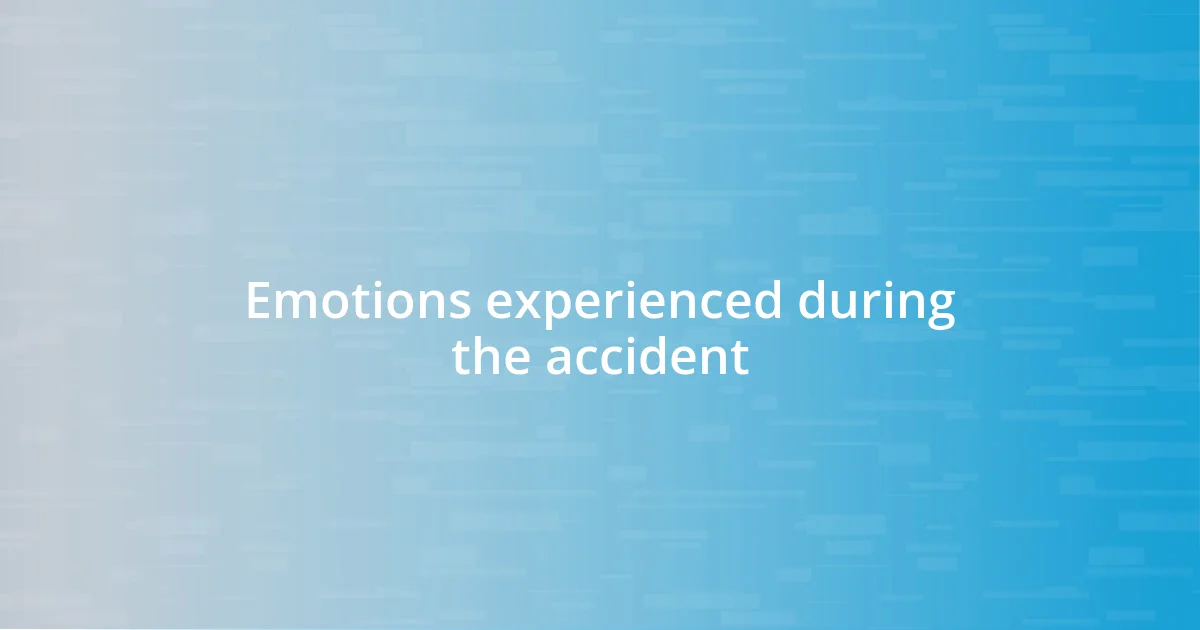
Emotions experienced during the accident
The moment the accident occurred, a wave of disbelief washed over me. I could hardly wrap my mind around what had just happened. As I sat there dazed, my heart raced, and panic bubbled up like a tidal wave, making it difficult to think clearly. Have you ever felt so overwhelmed that you couldn’t make sense of your surroundings? It’s a unique blend of fear and confusion that sticks with you long after the incident.
Suddenly, a deep sense of vulnerability crept in. In that instant, I realized how fragile our sense of safety truly is. I could no longer take simple drives for granted. The emotional rollercoaster I experienced left me grappling with shame and regret—was there something I could have done differently? These reflections took me down a path of self-discovery, forcing me to confront my fears about driving head-on.
As time passed, I noticed a bittersweet layer of gratitude developing within me. I realized the accident, though traumatic, had pushed me to reevaluate my priorities. Amidst the chaos, there was a lesson wrapped in emotional turmoil. Was I more aware of my surroundings now? Absolutely. I found that embracing vulnerability ultimately led to a deeper appreciation for life itself.
| Emotion | Description |
|---|---|
| Fear | A sudden, overwhelming response to the impact of the accident, coupled with panic that clouded my judgment. |
| Vulnerability | A sharp realization of how quickly safety can be taken away, leaving me feeling exposed and anxious. |
| Regret | A lingering sense of wishing I had reacted differently during the moments leading up to the accident. |
| Gratitude | An unexpected appreciation for life that emerged through dealing with the aftermath and my emotional journey. |
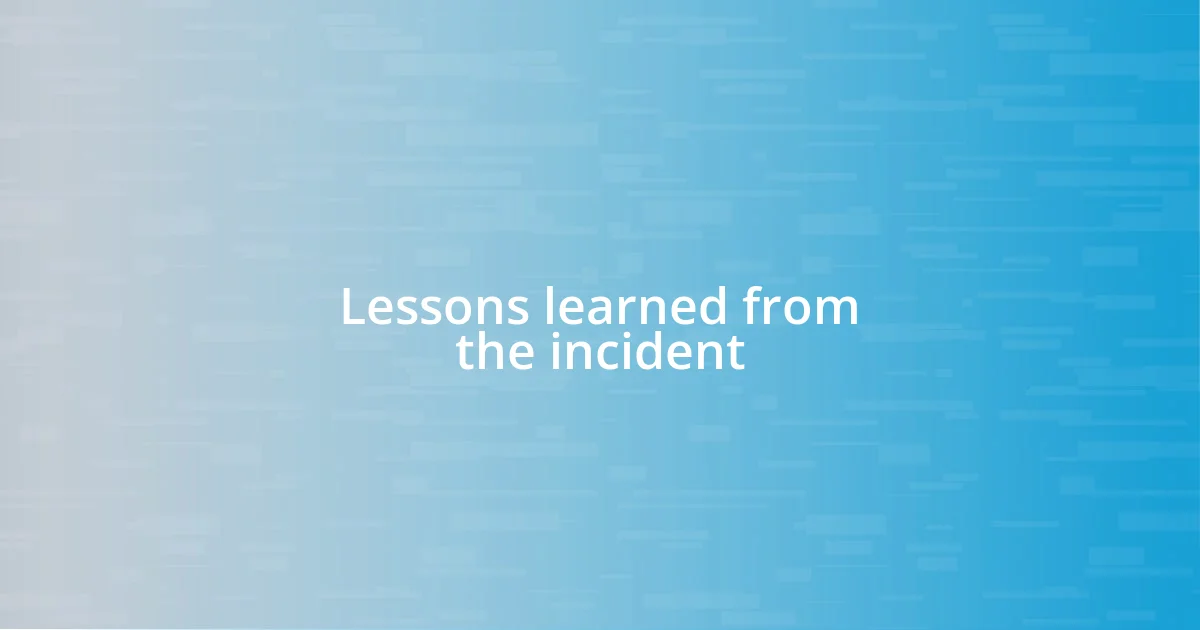
Lessons learned from the incident
Reflecting on that incident, I gained invaluable insights that shaped not only my approach to driving but also my perspective on life’s unpredictability. I knew I had to confront my fears head-on instead of avoiding them. This realization became a powerful catalyst for change. I remember one day, while driving down a familiar road, a sudden jolt of anxiety swept over me. Instead of succumbing to it, I took a deep breath and reminded myself that I had the skills to navigate this challenge safely. That empowerment was a tangible lesson learned: facing fear can be a path to reclaiming control.
Here are some important lessons I took away from that experience:
- Emotional Awareness: Understanding my emotional state is crucial. It not only helps in managing fear but also in making better decisions.
- Accept Vulnerability: Being vulnerable isn’t a weakness; it’s a sign of humanity. Accepting it can help foster resilience.
- Embrace Change: I learned to adapt my driving habits, like maintaining a safe distance and being more observant, which ultimately made me a better driver.
- Be Present: Each drive is an opportunity to practice mindfulness. Being fully engaged in the moment keeps distractions at bay.
- Seek Support: Talking about my feelings and experiences with friends or family provided reassurance and helped me process the trauma.
These lessons served as stepping stones to not just recover but thrive, transforming a painful experience into a foundation for personal growth.
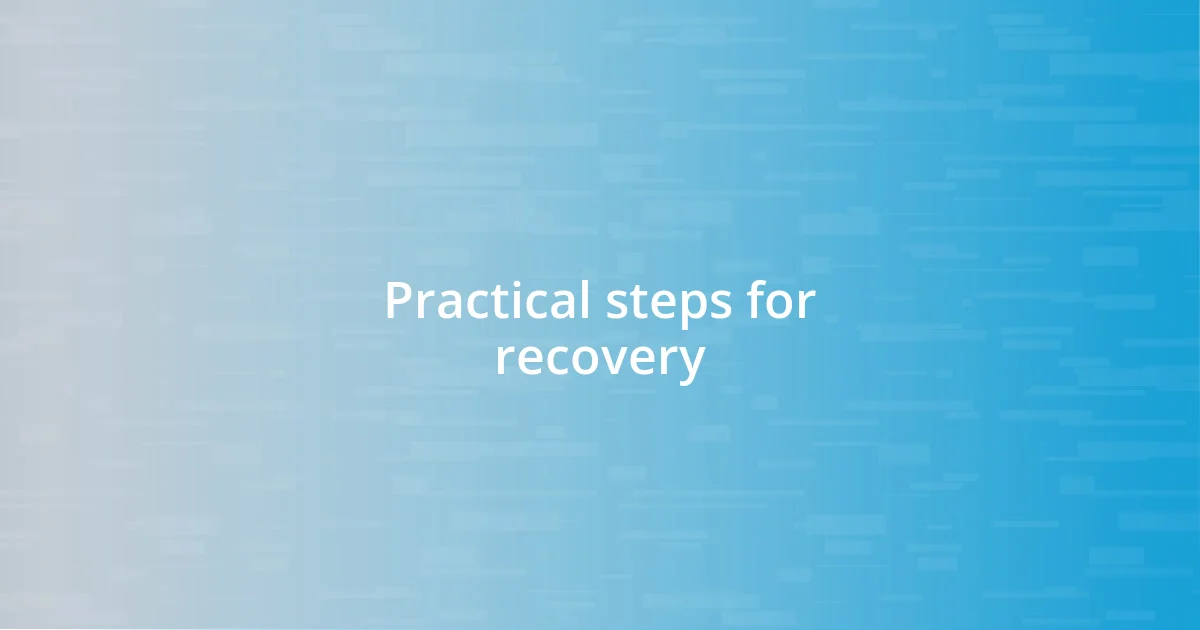
Practical steps for recovery
When it comes to recovery, the first step I took was creating a structured plan. It felt daunting at first. I sat down and wrote out specific goals, both emotional and practical. Whether it was setting aside time each week to reflect on my feelings or focusing on improving my driving skills through practice, clarity really brought me comfort. Have you ever noticed how a little bit of structure can guide you when chaos reigns? It’s helpful to map out a path forward.
Next, I discovered the power of journaling. Each day, I’d reflect on my experiences and emotions surrounding the accident. Writing allowed me to untangle complex feelings, like the frustration of anxiety creeping in when I got behind the wheel again. One afternoon, I poured out my thoughts about a trip to the grocery store that felt overwhelming but rewarding. That little victory reminded me of the progress I was making. Isn’t it amazing how acknowledging these small wins can spark motivation?
Additionally, I found it incredibly beneficial to engage in conversations with others who had experienced similar situations. I made it a point to open up during coffee catch-ups with friends, sharing my fears and triumphs. Their stories created a sense of community and reassurance, like a comforting blanket in a storm. Through these discussions, I realized we are never truly alone in our struggles. How powerful is it to recognize shared experiences? It can be comforting to know that others, too, have walked that shaky path toward recovery.
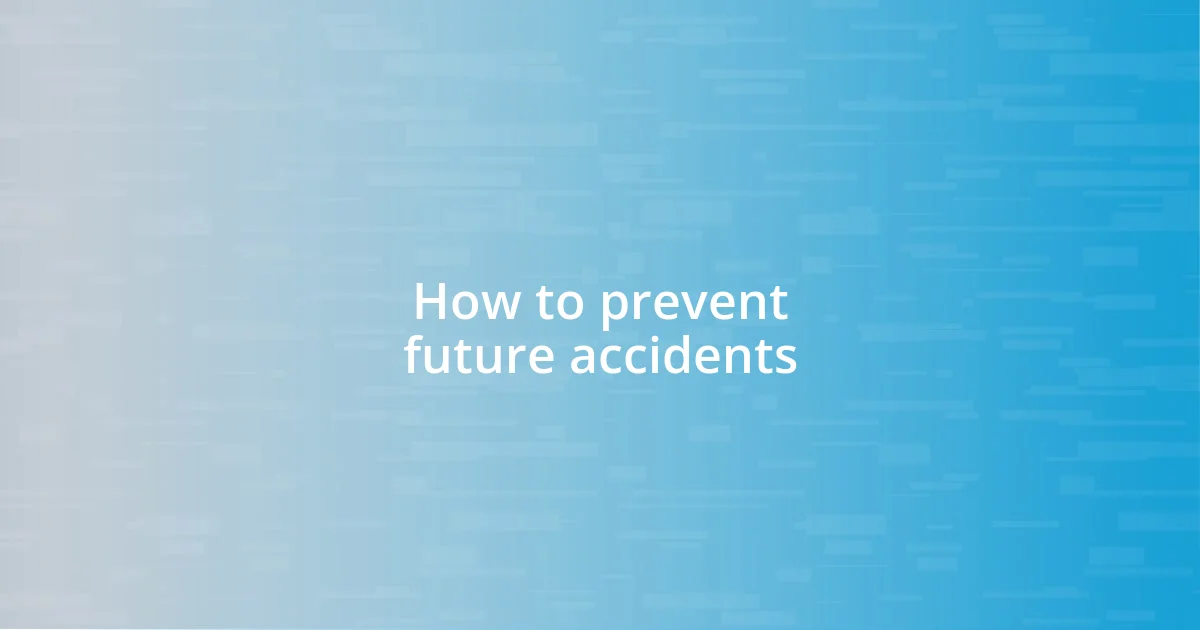
How to prevent future accidents
When it comes to preventing future accidents, the first thing that comes to mind is the importance of awareness. I recall the time I almost missed a blind spot while changing lanes—just thinking about it sends a shiver down my spine. I realized that taking a moment to scan my surroundings can make all the difference. Simple actions, like adjusting mirrors before hitting the road, can significantly reduce risks. How often do we take those extra seconds to check?
Another crucial step I’ve embraced is taking regular breaks during long drives. I remember one particularly exhausting road trip where fatigue almost became my co-pilot. Stopping to stretch my legs and hydrate wasn’t just a luxury; it became an essential routine for me. Those breaks not only refreshed my body but also cleared my mind, allowing me to remain focused and alert. Isn’t it fascinating how just a few minutes can reshape our driving experience?
Finally, I found that participating in defensive driving courses heightened my skills and confidence. After my first accident, I enrolled in a class that offered a deeper understanding of road safety. The instructors shared real-life scenarios that resonated with my own experience, making every lesson practical and actionable. Have you considered how investing time in such courses can transform your driving habits? It’s all about being proactive, and I can confidently say those classes became a game-changer for me.
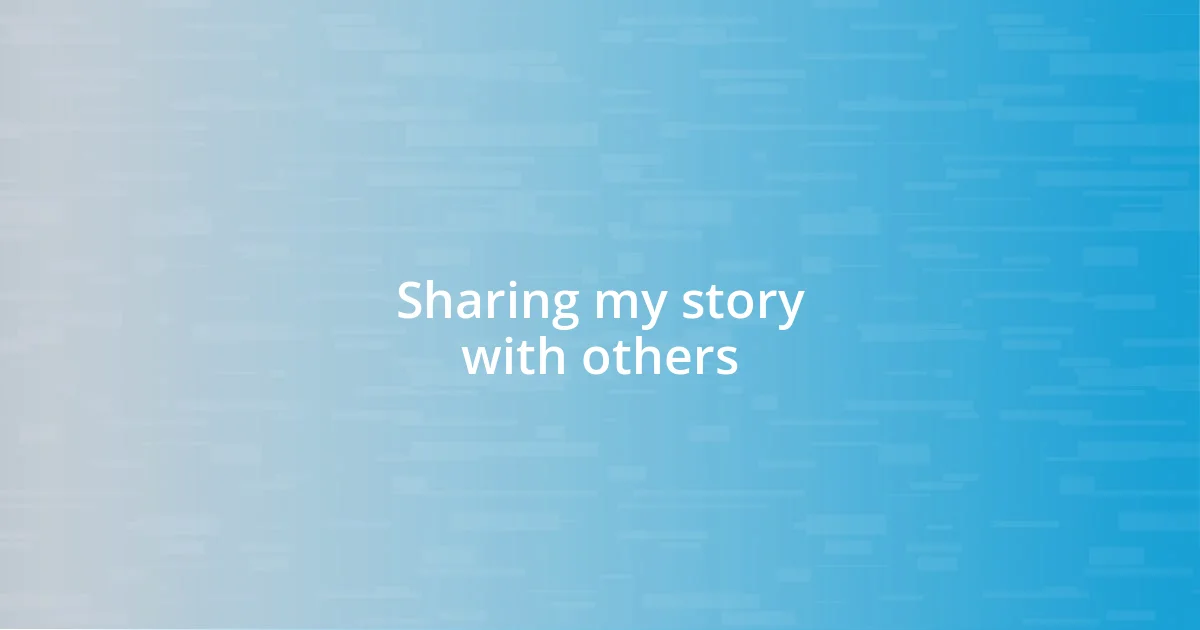
Sharing my story with others
I’ve found that sharing my story after the accident opened unexpected doors for connection. One evening, I decided to join a local support group. Initially, my heart raced from nerves, but as I shared my experience, I saw nods of understanding all around the room. It dawned on me how vital it is to voice our fears and our journeys. Have you ever experienced the relief that comes from simply being heard?
Sharing my experiences on social media also helped me connect with others facing similar challenges. I wrote a heartfelt post detailing my emotional ups and downs after the accident. To my surprise, dozens of friends reached out, sharing their own stories and lessons learned. It struck me how powerful vulnerability can be in creating a sense of belonging. Isn’t it interesting how, in moments of openness, we can forge connections that feel both profound and reassuring?
One of the most rewarding parts of sharing my story has been mentoring new drivers. I began volunteering with a local driving school, where I could relate my experiences to budding drivers. Witnessing their progress has been incredibly fulfilling. Seeing them reach milestones—even the small ones—reminds me of my journey, igniting such a sense of joy. How gratifying is it to transform your struggles into guidance for others, helping them navigate their own roads?
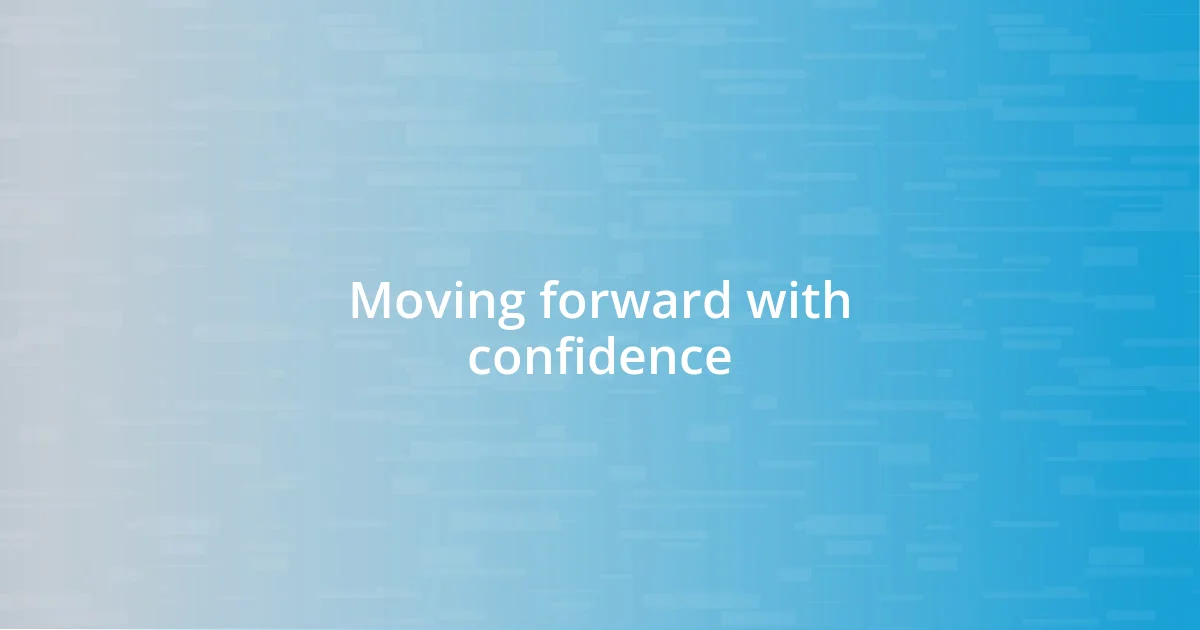
Moving forward with confidence
After my accident, I realized that moving forward with confidence is about understanding my limitations and strengths. I vividly remember the first time I sat back behind the wheel after the incident—I felt a whirlwind of emotions, from fear to determination. Instead of shying away from driving, I decided to tackle short routes at first, gradually rebuilding my trust in myself. Isn’t it incredible how small steps can nurture a sense of accomplishment?
I’ve come to appreciate the power of positive affirmations in this journey. Each time I drove, I repeated reminders to myself like, “I’m a capable driver” and “Every trip is an opportunity to grow.” Some might think it sounds simplistic, but I can assure you, those words grounded me, replacing doubt with assurance. Have you ever taken a moment to consciously reassure yourself during a challenging situation? It can make all the difference.
Connecting with fellow drivers also bolstered my confidence. One evening, I attended a local driving workshop where we shared experiences. Listening to others discuss their challenges was both reassuring and empowering. I left that session feeling like part of a community that understands the ups and downs of driving. Isn’t it fascinating how we can draw strength from the stories of others as we navigate our own roads?


